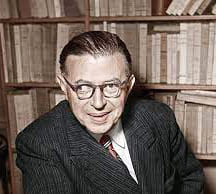Jean-Paul Sartre | Brief Biography
Jean-Paul Sartre | Brief Biography
Jean-Paul Sartre (1905-1980) was a French philosopher, playwright, novelist, and political activist. He was one of the leading figures of the 20th-century existentialist movement, and his works are considered some of the most important contributions to the philosophy of existentialism.
Sartre was born in Paris, France, on June 21, 1905. His parents were separated when he was young, and he was raised by his grandparents. He studied philosophy at the École Normale Supérieure in Paris, where he met Simone de Beauvoir, who would later become his lifelong companion and collaborator.
In 1929, Sartre published his first book, “The Wall,” a collection of short stories that dealt with the themes of freedom, authenticity, and the human condition. This was followed by the publication of “Nausea” in 1938, a novel that is considered one of the most important works of existentialist fiction. The novel tells the story of Antoine Roquentin, a disillusioned writer who experiences a profound sense of emptiness and meaninglessness in his life.
During World War II, Sartre was conscripted into the French army, and he was taken prisoner by the Germans in 1940. He was released a year later, and he used his experience as a prisoner of war as the basis for his play “No Exit.” The play, which was first performed in 1944, is a seminal work of existentialist theatre and explores the themes of freedom, responsibility, and human relationships.
In 1945, Sartre published his most famous work, “Being and Nothingness,” a philosophical treatise that presents a comprehensive overview of his existentialist philosophy. In this work, Sartre argues that human beings are fundamentally free and that they are responsible for creating their own meaning in life. He also asserts that there is no inherent meaning in the world and that it is up to individuals to create their own sense of purpose.
In addition to his philosophical writings, Jean-Paul Sartre was also a committed political activist. He was a vocal critic of colonialism and imperialism, and he supported the student protests and workers’ strikes of 1968. He was awarded the Nobel Prize in Literature in 1964, but he declined the award, stating that he did not want to be associated with any official institution.
Sartre died on April 15, 1980, in Paris, France. He remains one of the most influential figures of the 20th century, and his works continue to be widely read and studied today. 0 0 0.
Sources:
“Jean-Paul Sartre: A Bibliography” by Margaret A. Simons
“The Cambridge Companion to Sartre” edited by Christina Howells
“Existentialism is a Humanism” by Jean-Paul Sartre
“Being and Nothingness” by Jean-Paul Sartre
“The Wall and Other Stories” by Jean-Paul Sartre
“Nausea” by Jean-Paul Sartre
“No Exit” by Jean-Paul Sartre. ***
N.B. The article originally belongs to the book entitled ‘Biographies of Writers Around the World‘ by Menonim Menonimus.
Books of Biography by M. Menonimus:
- The World Writers-Brief Biographies
- Introduction to World Writers
- Introduction to World Personalities
- Love of Reputed Persons
- Brief Biographies of Prominent Bengali Writers
- Brief Biographies of Eminent Monarchs
- Brief Biographies of Ancient Thinkers and Writers
- Brief Biographies of Eminent Generals and Conquerors
- Biographies of Writers Around the World ..
Books of Literary Criticism by M. Menonimus:
- World Short Story Criticism
- World Poetry Criticism
- World Drama Criticism
- World Novel Criticism
- World Essay Criticism
- Indian English Poetry Criticism
- Indian English Poets and Poetry Chief Features
- Emily Dickinson’s Poetry-A Thematic Study
- Walt Whitman’s Poetry-A Thematic Study
- Critical Essays on English Poetry
- Tawfiq al-Hakim’s Novel: Return of the Spirit-An Analytical Study
- Tawfiq al-Hakim’s Novel: ‘Yawmiyyat Naib Fil Arayaf’-An Analytical Study
- Analytical Studies of Some Arabic Short Stories
- A Brief History of Arabic Literature: Pre-Islamic Period (500 AD-622 AD)
- A Brief History of Arabic Literature: Early Islamic Period (622 AD-661 AD)
- Reviews on William Shakespeare’s Works
- Reviews of Charles Dickens’ Works
- Reviews of John Milton’s Literary Works
- Reviews of Some Iconic Travelogues …
Additional Searches:
- Famous Writers
- The Lives of the Poets
- 10 Best Generals of All Time
- Muslim Leaders in History
- Best Military Commanders of All Time …











